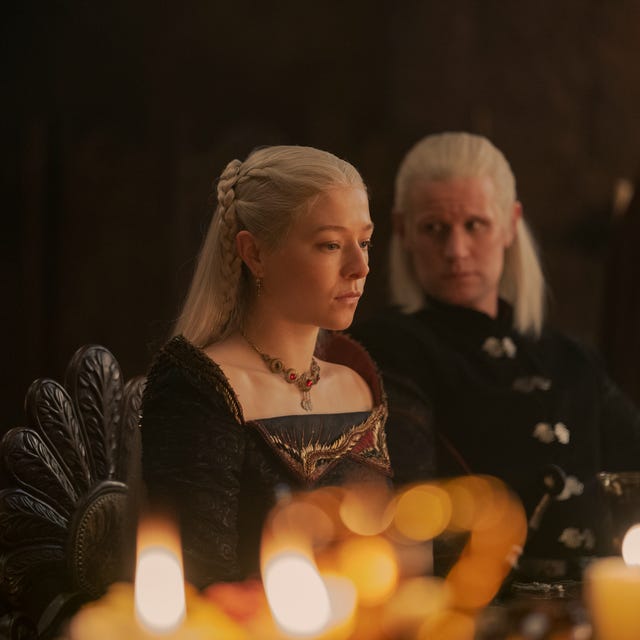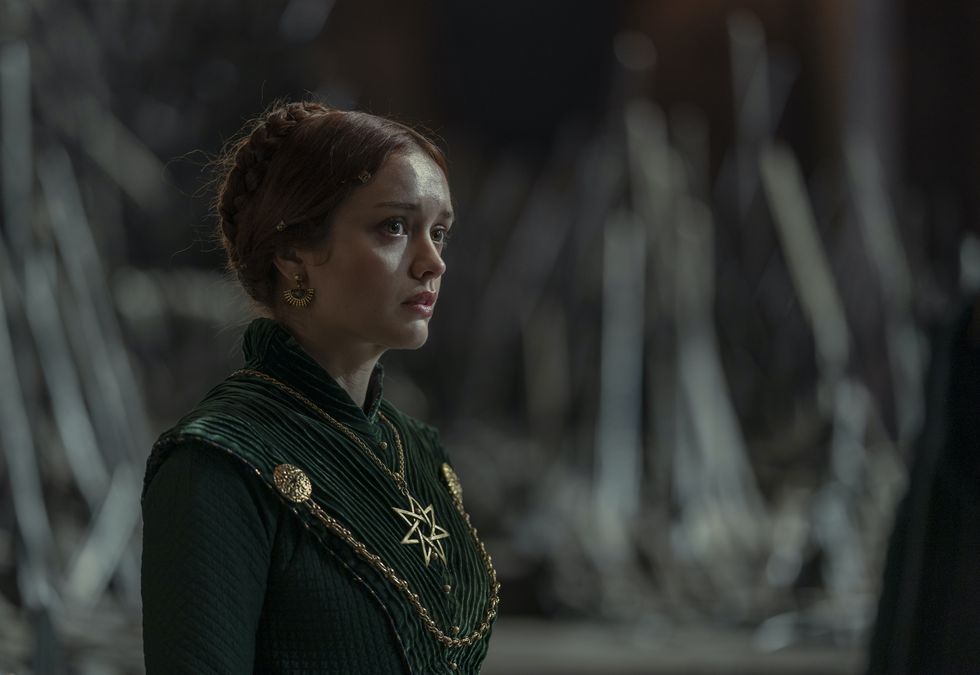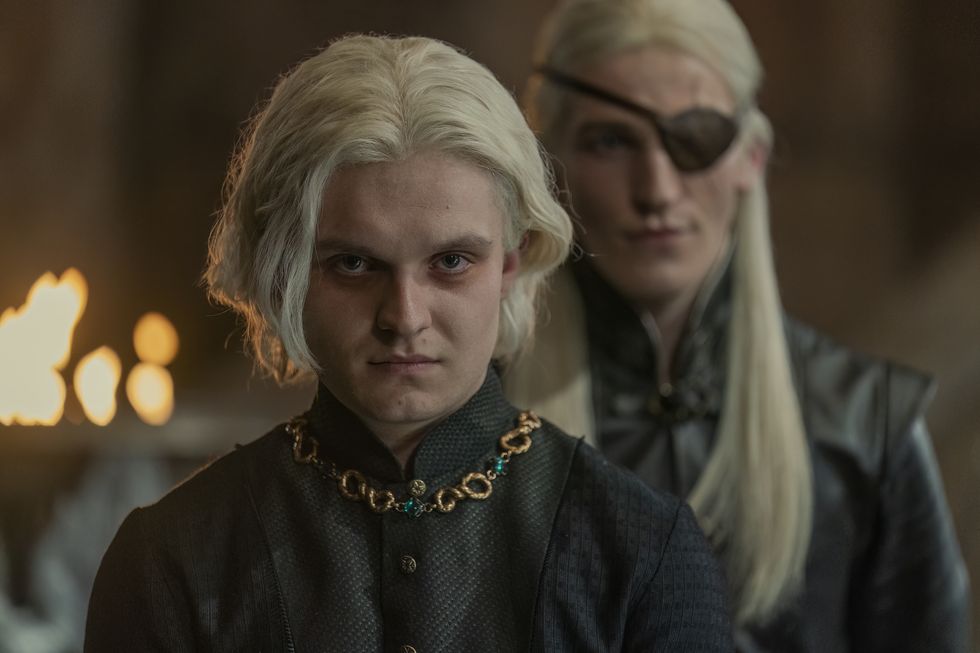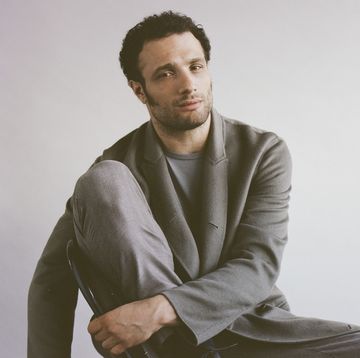“My brother cares only for the history books,” a lightly treasonous Vaemond Velaryon informs Princess Rhaenys in the opening of House of the Dragon’s eighth episode, ‘The Lord of the Tides’. His brother, Corlys Velaryon (Steve Toussaint), currently lost at sea, has announced his desire for the Driftmark throne to pass down to Lucerys Velaryon, Rhaenyra’s son. Vaemond is worried: it’s widely rumoured, and confirmed by this show, that Rhaenyra’s mop-haired children are illegitimate. If Driftmark passes to the young prince, the Velaryon name may be intact, but what about Velaryon blood? What of the living, breathing members of this family? Should history really dictate what happens in the present day?
Eight episodes in, this has emerged as a central motif for House of the Dragon; its characters grapple with their decisions, weighing their desires against public perception (both in the present and the future). That the viewer is so familiar with this world’s history – Game of Thrones begins almost 200 years later – adds another layer to the unfolding history. The Targaryen dynasty burns out – remembered mostly for their dragons, incest and insanity – but watching these characters act as though they may live forever has a certain mad charm.
Things have settled after last week’s turbulence. Daemon (Matt Smith) and Rhaenyra (Emma D'Arcy), now married, have two new children and a third on the way. Alicent (Olivia Cooke) and her father Otto (Rhys Ifans) have stepped up control in King’s Landing as Viserys’ health continues to falter. And as news sweeps Westeros that Vaemond will be making a play for the Driftmark throne, Daemon and Rhaenyra travel to King’s Landing to assert Lucerys’ right for the throne. Rhaenyra’s reputation is once again at stake here: her children’s legitimacy, a reflection of her own choices, haunt her with a real threat. As the various factions gather to discuss Driftmark – and seeing these families together really elucidates how unfit they all are to rule – lines are drawn between Vaemond and Rhaenyra’s family.
It’s a slight plot, made slighter by a last-minute intervention by the beleaguered Viserys. He seeks Rhaenys’ advice, and she decides to back Lucerys, at the same time announcing that the Targaryen prince and Rhaena (Rhaenys’ granddaughter) should marry. That was a last-minute manoeuvre set up by Rhaenyra, showing, finally, some shrewdness on the heir’s part. Vaemond, appalled, insults Rhaenyra and her children. Daemon, insulted, slices off his head. This was queasy, pause-worthy, gasp-inducing TV. Matt Smith is head and shoulders over everyone else here; the joy is getting to know Daemon more, the thrill is not knowing what he’s going to do next. He’s wiped out entire towns; he’s murdered his first partner, now he’s softened into a bloodthirsty wife guy.
Apart from the beheading, which has an almost – almost! – comic tone thanks to a well-placed punchline and a visual style reminiscent of mid-00s slasher movies, the main action takes place at the Targaryen family dinner between Rhaenyra and Alicent’s clan. These events are so tense, such bloody and cruel affairs, that you are waiting for those young people not to make it out alive. (That killer atmosphere mostly results from Alicent’s deeply disquieting children: since last week, drunken philanderer Aemond has married his sister Helaena, while one-eye Aemond has become the show’s eye-patched arch-antagonist.)
Much smarter, much scarier, to play it awkward. This series began with an attempt to keep peace in Westeros and maintain Targaryen rule. Viserys, now apparently at the end of his rule, is unable to keep even his close family from bickering. Inevitably, those murderous princes cause some trouble. But amid the silences and hard stares, something thaws between Rhaenyra and Alicent, who remember that they have more in common – though arguably a lot of their mutual interests divide them – and their bodies visibly relax as they circle around reconciliation. While Rhaenyra enjoys the status of being a fan favourite, Cooke deserves credit for bringing a chilling, unhinged mystery to Alicent.
What of those last few moments? The final gasps of a drugged-up king, the invocation of “a song of ice and fire” (both the name of Martin’s book series, and Aegon’s dream about Targaryen rule)? Alicent’s misinterpretation of Viserys’ words will no doubt drive the oncoming civil war, but a sense of resignation, assisted by the show’s visual darkness, seems to set in among Westeros’ royalty. Rhaenys, who has effectively become childless in the course of two episodes, seems accepting of her ongoing misery. Rhaenyra loves her children, but her enthusiasm for the throne seems less certain. Alicent’s political hunger seems to be fuelled more by her personal vendetta with Rhaenyra than a desire to reign. Only Otto Hightower embraces ambition openly; Ifans’ wide-legged perch atop the Iron Throne, in Viserys’ absence, was one of the more memorable images in this week’s episode.
Ifans’ slightly self-conscious scramble for the throne is a helpful image for this show; these characters seem hot and cold on power, both attracted to and embarrassed by their desire for rule. As House of the Dragon nears a season finale, you suspect something momentous looms to galvanise them.
Henry Wong is a senior culture writer at Esquire, working across digital and print. He covers film, television, books, and art for the magazine, and also writes profiles.















